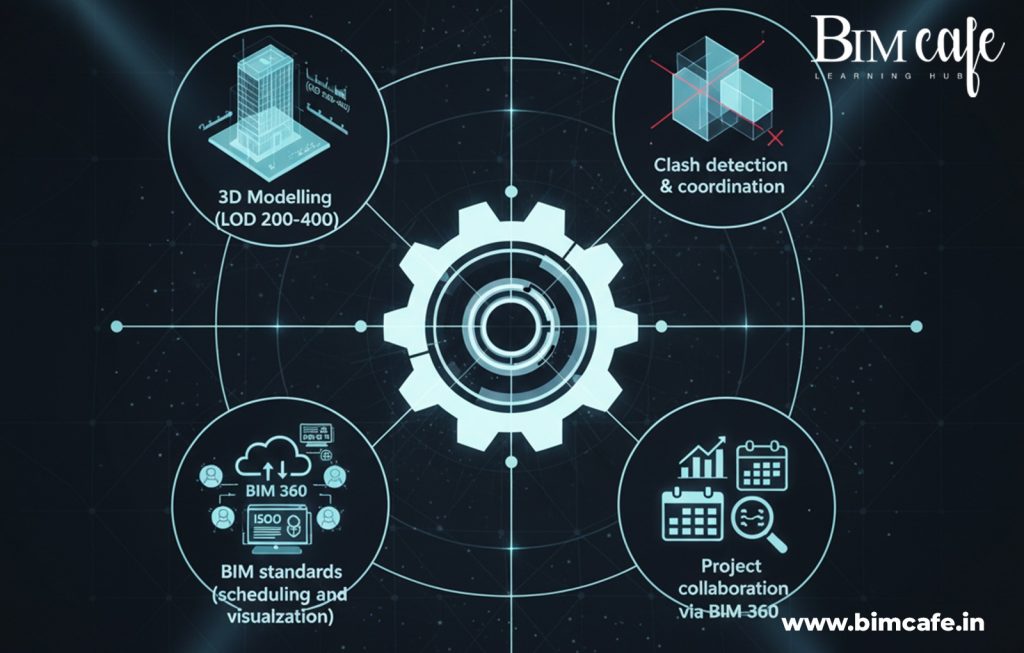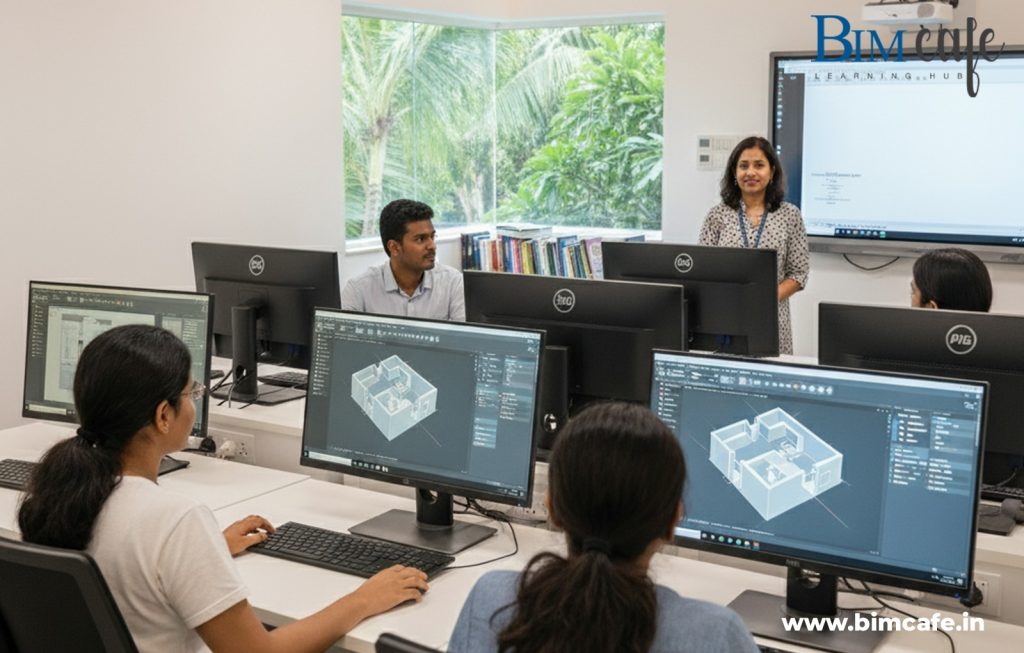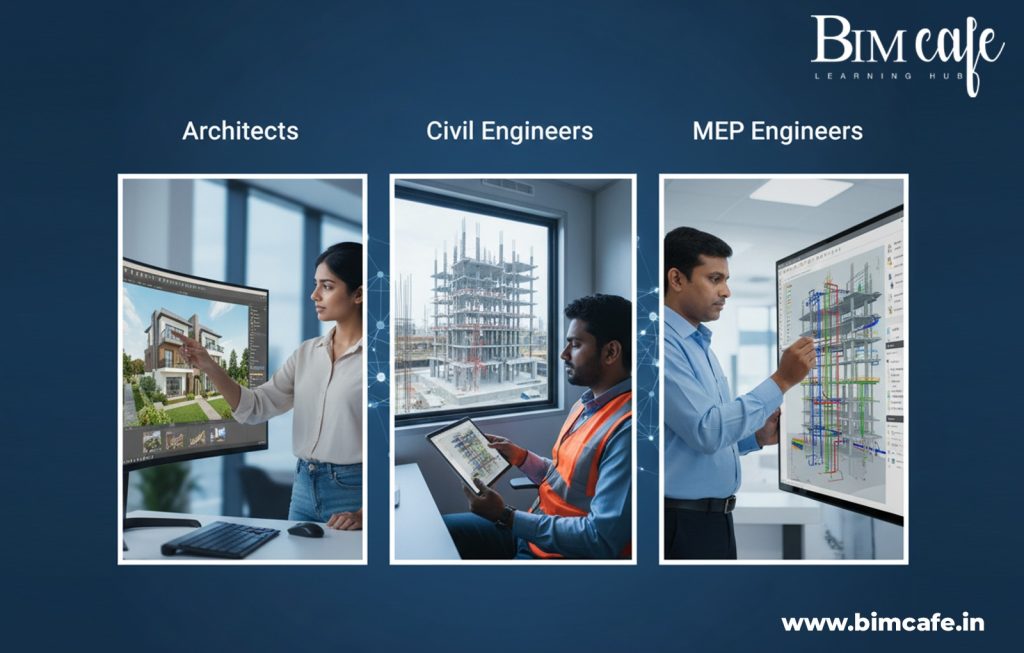
Author: Devika R
October 25, 2025
7 min read
If you are a student, recent graduate, or professional in architecture, civil, or MEP engineering, you’ve probably noticed a major shift in how buildings are designed, executed, and managed — and at the center of this change is Building Information Modeling (BIM). BIM is no longer just a software tool; it is a holistic process that integrates design, documentation, construction, and facility management into a single intelligent digital model.
In Kerala, this transformation is highly visible. From Kochi’s ambitious smart city and infrastructure projects to Thrissur’s emerging design and construction startups, BIM is rapidly becoming the new professional standard, driving efficiency, accuracy, and sustainability across projects of all scales. Whether it’s improving collaboration among multidisciplinary teams, enabling clash-free construction, or supporting energy-efficient and sustainable designs, BIM is reshaping the AEC landscape.
But here’s the challenge: not every BIM course delivers the skills and exposure needed for today’s global AEC industry. Choosing the right program is crucial — one that combines technical software mastery, industry best practices, live project experience, and placement opportunities.
This guide is designed to walk you through everything you need to know to select the most suitable BIM course in Kerala, helping you build a career that aligns with international standards and future-ready construction practices.

Understand What BIM Training Really Means
BIM (Building Information Modeling) is much more than learning software tools like Revit or Navisworks. At its core, BIM is a comprehensive methodology that enables professionals to digitally plan, design, construct, and maintain buildings with precision. It brings together architecture, structural engineering, MEP, and project management into a single collaborative platform, ensuring better coordination, reduced errors, and more efficient workflows across all project stages.
A high-quality BIM course equips you with practical skills that go beyond 3D modeling, helping you handle real-world projects effectively. Here’s what you can expect to learn:
- 3D Modeling (LOD 200–400): Create accurate and detailed digital representations of building elements, including geometry, dimensions, and placement.
- Clash Detection & Coordination: Identify and resolve conflicts between architectural, structural, and MEP systems before construction begins.
- BIM Standards (ISO 19650, COBie): Understand international standards for data management, model sharing, and project documentation.
- Project Collaboration via BIM 360: Work seamlessly with teams on cloud-based platforms for design reviews, version control, and communication.
- Quantity Take-off, Scheduling, & Visualization: Extract material quantities, plan construction timelines, and generate realistic visualizations for better decision-making.
A course that covers these aspects ensures that you are industry-ready, capable of handling multidisciplinary projects, and prepared for global BIM practices.

Choose a Certified BIM Training Institute
When selecting a BIM course, always prioritize Autodesk Authorized Training Centres (ATCs). These institutes guarantee that the curriculum meets international standards, the trainers are certified professionals, and the certifications you earn are globally recognized. Training at an authorized center ensures you gain skills that are immediately relevant to the industry and widely accepted by employers worldwide.
For example, BIM Cafe Learning Hub is an Autodesk Certified Partner offering professional BIM courses in Kochi, Calicut, and Trivandrum. Their programs combine hands-on project experience with certified training and provide assurance of placement through partnerships with leading industry players like DDG BIM Services, bridging the gap between learning and real-world application.
Choosing a certified institute not only enhances your technical expertise but also boosts your credibility and employability in India and abroad. Take the next step in your BIM career — contact BIM Cafe Learning Hub today to enroll in certified, hands-on training and secure your pathway to industry-ready expertise.

Match the Course to Your Career Field
Different professionals require different BIM skillsets. Here’s how you can choose:
| Profession | Recommended BIM Course | Key Software Tools |
| Architects | Architectural BIM & Design Development | Revit Architecture, Enscape, Lumion |
| Civil Engineers | Structural Design Concepts & BIM | Revit Structure, Staad Pro, ETABS |
| MEP Engineers | Revit MEPF Master Course | Revit MEP, Navisworks Manage |
| Interior Designers | Advanced Diploma in Interior Design & BIM | SketchUp, 3ds Max, Revit, V-Ray |
Choosing the right specialization improves your career alignment and placement readiness.

Look Beyond Software – Choose Job-Oriented BIM Courses
A high-quality BIM course goes far beyond just teaching software skills. The focus should be on real-world application, preparing you to handle actual projects and collaborate effectively within multidisciplinary teams. Look for courses that provide:
- Project-Based Training Using Live Models: Work on real or simulated construction projects to understand workflow, coordination, and problem-solving in a practical setting.
- Mentorship from Industry Experts: Learn directly from professionals with hands-on experience, gaining insights into best practices, standards, and industry expectations.
- Portfolio Creation for Job Readiness: Build a portfolio of completed projects to showcase your skills to potential employers.
- Assurance of Placement with Reputed BIM Companies: Courses that connect you with industry partners provide a direct path to employment after training.
Institutes like BIM Cafe Learning Hub specialize in bridging the gap between theoretical learning and real-world application. By integrating live projects, certified training, and placement support, they ensure that graduates are not only skilled but also ready to contribute confidently to international BIM projects.

Decide Between Online and In-Person Training
| Feature | Online BIM Training | Classroom Training |
| Flexibility | Learn from anywhere | Fixed schedule |
| Live Projects | Limited | Extensive |
| Trainer Interaction | Moderate | High |
| Networking | Minimal | Strong |
| Placement Opportunity | Variable | High |
Recommendation: If you’re based in Kerala and seeking real project exposure, in-person training (like BIM Cafe’s Kochi or Calicut centre) is ideal.
Compare Course Duration and Levels
| Course Type | Duration | Suitable For |
| Professional BIM Course | 4–5 months | Civil/MEP Professionals |
| Master BIM Course | 6 months | Job Seekers & Engineers |
| Advanced Diploma in Interior Design & BIM | 8 months | Interior Designers |
| FastTrack BIM | 30 Days | Working Professionals |
Evaluate Placement Records & Industry Connections
Before enrolling in any BIM course, it’s crucial to scrutinize the institute’s placement support and industry links. This ensures your investment translates into real career opportunities. Ask these key questions:
- Do they offer placement assurance or just “support”? Look for programs that guarantee guidance and opportunities, rather than leaving job hunting entirely to you.
- Are there industry partners or real BIM projects involved? Courses tied to active BIM projects provide hands-on experience, making your learning practical and directly relevant to employers.
- Can I view student portfolios or testimonials? Reviewing past student work and success stories helps gauge the quality of training and real-world applicability.
For example, BIM Cafe Learning Hub collaborates with DDG BIM Services, providing students with practical project exposure and recruitment-ready training, ensuring that graduates are well-prepared to enter the professional BIM workforce.
Why Kerala Is Becoming India’s BIM Learning Hub
Kerala is emerging as a key center for BIM education and professional development due to its rapid infrastructure growth, smart city initiatives, and progressive digital adoption policies. The state’s emphasis on modern construction practices and technology-driven design has created a strong demand for BIM-trained professionals across civil, architectural, and MEP disciplines.
Cities like Kochi, Kozhikode, Trivandrum, and Thrissur are now home to numerous BIM-enabled projects, ranging from commercial complexes to smart infrastructure developments. As a result, companies are actively seeking candidates with hands-on BIM experience, international-standard certifications, and practical project exposure.
Market Forecast: The BIM job market in South India is projected to grow by 40% by 2026, making early adoption of BIM skills a significant career advantage for aspiring professionals.
Conclusion: Choose Smart, Learn Smart
Selecting the right BIM course is about preparing for a global, collaborative work environment, not just mastering software. A professional-ready course should offer:
- Hands-on BIM Project Experience: Real or simulated projects to develop practical skills.
- Certified Training: Credentials recognized by Autodesk and industry leaders.
- Assurance of Placement: Strong connections with BIM companies for career opportunities.
Institutes like BIM Cafe Learning Hub are leading the way by combining structured learning, expert mentorship, and real project integration, empowering students to become part of Kerala’s next generation of BIM-ready professionals, fully prepared to meet both national and international industry standards.




